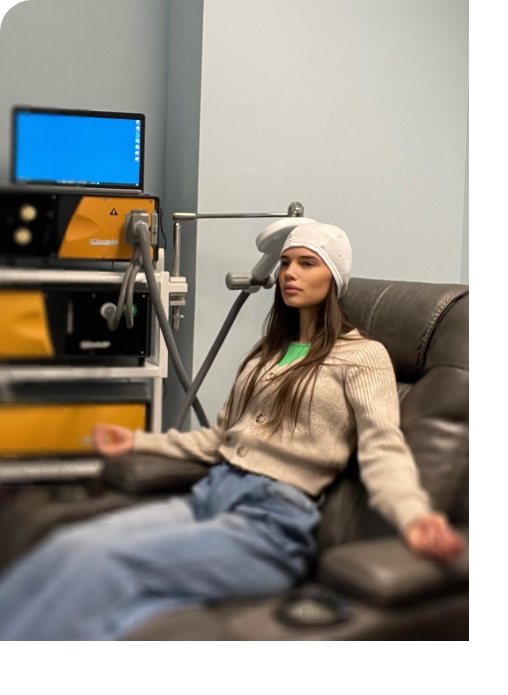Finding reliable TMS providers near me is no...Read More
Take this next step, we’ll help with the others.

Living with symptoms of depression can feel overwhelming, but hope is closer than you think. With TMS Near Me, a future free from major depression is possible.
At our Treatment Center in New York City, we care deeply about your well-being, and our team is here to help you or your loved one rediscover joy and stability. We provide comprehensive Psychiatric Care, including TMS sessions, Esketamine, and medication management.
Our therapy is FDA-cleared with minimal side effects of TMS and is proven effective in reducing depression symptoms and treatment-resistant depression.
TMS can serve as a stand-alone therapy or be combined with antidepressant medications for even greater results.
Our Treatment Center partners with most major carriers, including United Healthcare, and we handle the paperwork for you.
Unlike medication, TMS directly targets specific areas of the brain linked to mood regulation without systemic impact.
Transcranial Magnetic Stimulation (TMS) is an effective treatment for Major Depressive Disorder and other mood disorders. Using a precise TMS device, our psychiatrists deliver controlled magnetic pulses to the prefrontal cortex, stimulating underactive nerve cells and brain cells that regulate emotion.
During each session, the coil generates a gentle magnetic field that activates pathways just beneath the scalp. This brain stimulation enhances neuroplasticity, helping restore balance in circuits disrupted by severe depression, treatment-resistant depression, or obsessive-compulsive disorder. Patients seeking alternatives to antidepressant medications often turn to TMS as one of today’s most advanced treatment options.
A typical treatment course is an outpatient procedure lasting 15–20 minutes. Patients remain awake and comfortable while seated at our Medical Center. A full course of treatment may include 20–36 sessions across 4–6 weeks.
Unlike electroconvulsive therapy, TMS requires no anesthesia and carries no memory-related risks. Many individuals begin to notice symptom relief within 3–5 weeks.
Many patients notice positive changes within 3-5 weeks of treatment.


As a psychiatric professional with over 25 years of experience, I am dedicated to providing top-quality care to my patients in New York City and Montclair, New Jersey. I have had the privilege of serving at some of the nation’s leading medical institutions, including Beth Israel Hospital in New York, Tufts Medical Center in Boston, and Yale Medical School in Connecticut.
In addition to my clinical work, I am also an assistant professor at Rutgers University, where I have the opportunity to share my knowledge and experiences with the next generation of healthcare professionals. I believe in the importance of continuing education and professional development, and I am committed to staying current on the latest advances in the field of psychiatry.
I am passionate about helping individuals and their loved ones on their journey towards mental wellness. Whether you are seeking support for yourself or a loved one, I am here to help. Thank you for considering my practice, and I look forward to working with you.

I have been practicing psychiatry for nearly twenty years, first in Vienna, Austria, where I had the honor of studying medicine, then here, in New York City.
I did a year of Geriatric Psychiatry fellowship which allows me to work comfortably with elderly patients.
I also did a year of fellowship at the New York Psychoanalytic Institute and published in the fields of psychotherapy research, dementia, and Seasonal Affective Disorder .
As a psychiatrist and medical doctor, I can provide both medication management and psychotherapy, as well as non-medication treatments such as supplements and life style advice.
I offer psychopharmacology and psychotherapy services as well as holistic treatments based on scientific studies to significantly improve my patients’ well-being.
Having lived in Moscow, Vienna and New York for many years, I appreciate the beauty and relativity of all things human, and can provide treatment in these three languages.
Finding reliable TMS providers near me is no...Read More
Anxiety disorders affect millions of adults across New...Read More
Bipolar depression affects daily performance, long-term planning and...Read More
Living with attention challenges affects more than focus....Read More
When you type “TMS near me” into Google,...Read More
Attention-deficit/hyperactivity disorder (ADHD) affects millions of children and...Read More
TMS stands for Transcranial Magnetic Stimulation, an advanced therapy for mood disorders that uses a TMS machine to deliver safe magnetic pulses to the brain. This approach stimulates underactive areas of the brain linked to mood regulation, helping restore balance and improve emotional health. Many patients turn to TMS when traditional antidepressant medications have not provided relief.
A condition is labeled “treatment-resistant” if symptoms persist despite trying multiple evidence-based therapies. For example, depression is considered treatment-resistant after failing at least two antidepressant medications (at adequate doses and durations) combined with psychotherapy. This doesn’t mean you’re “out of options”—it simply guides us toward advanced therapies like TMS.
Yes, TMS is an outpatient procedure, performed at our Medical Center, allowing you to return to work or school immediately after your appointment. Each session lasts about 15–20 minutes, and no anesthesia is required. Because there is no recovery time, it fits easily into most daily routines.
Unlike antidepressant medications, TMS directly stimulates nerve cells in the prefrontal cortex. This targeted approach reduces the side-effects of TMS while addressing the root cause of mental health conditions. For patients with treatment-resistant depression, TMS can be an important next step when medications alone are not effective.
Yes! TMS can be safely combined with most medications. In fact, many patients use it alongside antidepressants or mood stabilizers. Never stop or adjust medications without consulting your prescribing provider first.
A full treatment course usually includes 20–36 sessions. Each course of treatment is customized to your unique needs. While some patients notice changes within just a few weeks, others may need the full series of treatments to experience maximum benefit.
If you’re searching for TMS Clinics Near or a TMS Clinic Near you, our conveniently located center in New York City is here to help patients across the five boroughs and the Tri-State area. We provide a welcoming, professional environment where you can receive expert Psychiatric Care close to home. Easy access to our location makes ongoing care more convenient and consistent.
We work with most major carriers, including United Healthcare, and serve as a network provider. Our team will coordinate with your insurance provider to ensure smooth access to care. While coverage varies, many patients are pleasantly surprised to learn that benefits are available for TMS treatment. Many patients find that their plan may include insurance coverage for TMS therapy. Our team can provide guidance and help you check directly with your insurance provider to confirm whether benefits are available for your course of treatment. Because every plan is different, verifying coverage is the first step toward determining your treatment pathway.
Some patients opt for periodic “booster” sessions to sustain results, similar to follow-up therapy or dental cleanings. We’ll create a personalized maintenance plan based on your progress and long-term goals.
Yes. In addition to Major Depressive Disorder, TMS Right has shown promise in reducing symptoms of chronic pain, obsessive-compulsive disorder, and Bipolar Disorder. Ongoing clinical trials continue to explore its benefits for a wide range of mental health conditions. This makes TMS one of the most exciting and versatile advances in modern Interventional Psychiatry.
Our Medical Center is committed to providing safe, effective care led by board-certified experts in Interventional Psychiatry. Patients choose us because:
Care is delivered by trusted specialists in Psychiatric Care and Primary Care
Our approach is supported by decades of published clinical trials in the United States
We are a trusted TMS Provider with a strong success rate in treating depression, anxiety, and Bipolar Disorder
Convenient location in New York City, serving patients across the five boroughs and the Tri-State area
A holistic model that integrates Psychiatric Care, Primary Care, and comprehensive Medical Center support
Choosing the right Treatment Center can make all the difference in recovery. Our team combines advanced technology, compassionate care, and personalized treatment planning to give every patient the best chance at lasting results.
Unlike ECT, TMS requires no anesthesia, doesn’t induce seizures, and has no risk of memory loss. It’s gentler, with minimal downtime, making it easier to integrate into daily life.
Avoid caffeine beforehand (it can heighten scalp sensitivity).
Remove magnetic-sensitive items (e.g., jewelry, credit cards).
Wear comfortable clothing—you’ll relax in a chair during treatment.
Contact our TMS coordinators at [email protected] for a free consultation. We’re here to help you make an informed, confident decision about your care!
Research into TMS has expanded worldwide since the late 1990s, when more than 20 randomized, controlled clinical trials demonstrated its effectiveness in treating major depression. Today, TMS is FDA-approved by the U.S. Food and Drug Administration (Drug Administration) and is recognized as a safe, advanced therapy for individuals seeking alternatives to antidepressant medications.
Beyond depression, TMS is now being studied and applied for a range of mental health conditions, including obsessive-compulsive disorder, Bipolar Disorder, chronic pain, and more. At our Treatment Center, we combine advanced technology with compassionate Psychiatric Care to deliver lasting results. Contacting us is the first step towards healing.
We use cookies to improve your experience on our site. By using our site, you consent to cookies.
Manage your cookie preferences below:
Essential cookies enable basic functions and are necessary for the proper function of the website.
These cookies are needed for adding comments on this website.
Google reCAPTCHA helps protect websites from spam and abuse by verifying user interactions through challenges.
Google Tag Manager simplifies the management of marketing tags on your website without code changes.
You can find more information in our Cookie Policy and Privacy Policy.